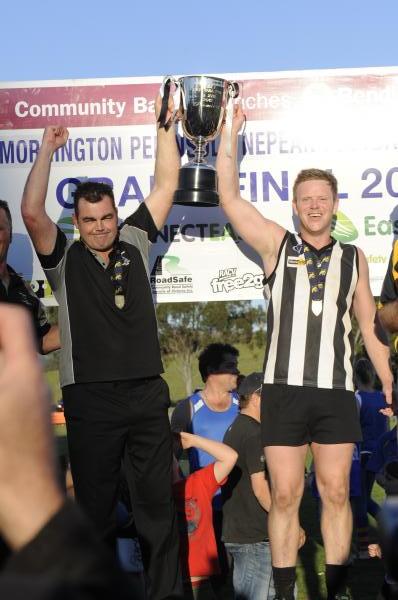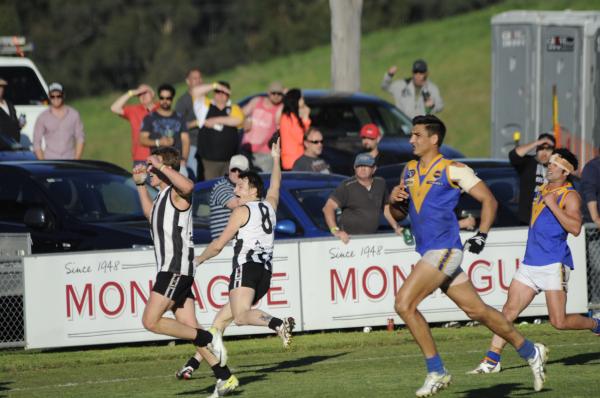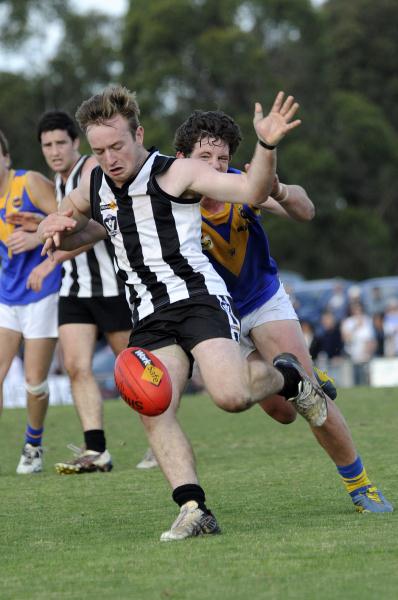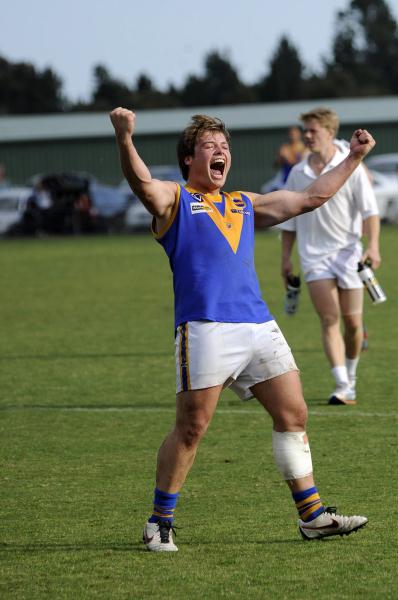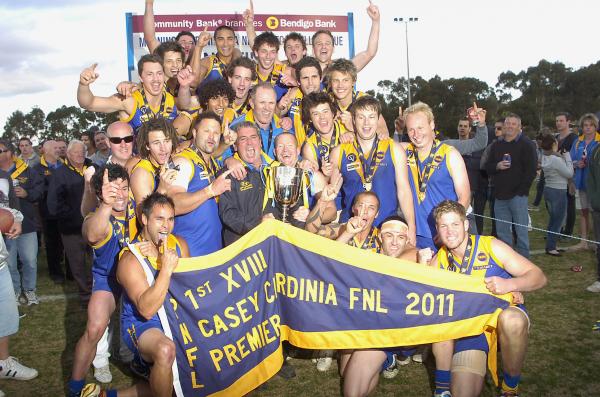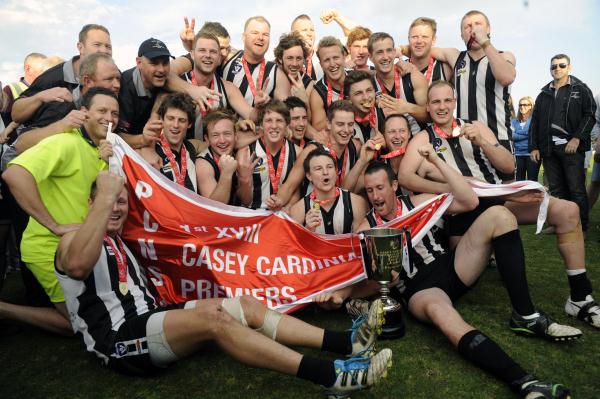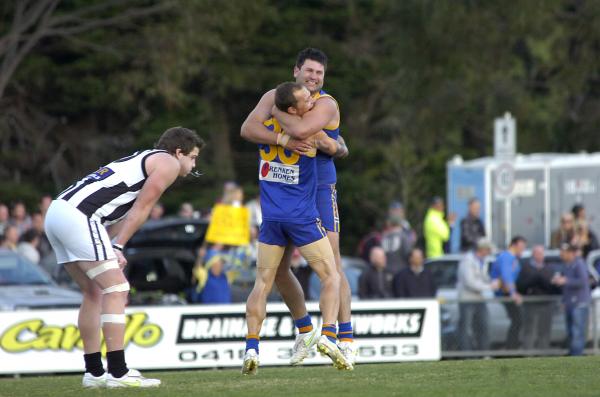
By Nick Creely
It’s a modern day rivalry that is almost certain to resurface itself on the biggest stage of them all in the coming years, such is the pride embedded within both footballing communities.
Two big towns with proud histories and an unquenching thirst for success – Narre Warren and Cranbourne, and the passion of both footballing communities epitomise all there is to love about local football.
For those lucky enough to witness the quality of football played between the two powerhouse clubs in a stunning wave of success and epic games in front of monster crowds between 2010 and 2014, they will happily say it was some of the finest spectacles on the local scene they’ve seen.
And it’s hard to argue with the quality of names and star power strutting their stuff each week.
But there was another layer to the rivalry besides just the on-field deeds and star power glittered across the park – mutual respect and an uncompromising competitiveness.
It was a will to win at all costs attitude, and with the drive of past losses and premierships at the forefront, it made for some riveting matches of football.
For a man right in the thick of the action, Narre Warren legend Nick Scanlon, he told the Gazette that respect was the basis for an incredible period of local footy, but still maintaining that fierce edge over the other.
“The first thing that comes to mind with that rivalry was that it was really healthy, there was a lot of respect,” he said.
“You kind of look at the other rivalries around the league that we’ve got, the Berwick or Beaconsfield rivalry going back a long time, and I don’t want to say it’s a hatred, but more down that line.
“But the Narre and Cranbourne of that era was definitely built around respect, and that’s the way I felt – I played Vic Country with Justin Berry on two occasions and interleague with him and the likes of Holty, and it wasn’t an unhealthy rivalry.
“When I think back, it was just based on respect.”
From the other side of the fence, long-time Cranbourne man and club president Shane Baker feels the same way, and added that the mutual respect flowed onto the ground more often than not.
“When it comes down to outdoing each other on a footy ground, that’s where it all should stay,” he explained.
“The two clubs have always had a great deal of respect for each other, sure there have been some blow ups over the years, but I think that’s an overflow of emotion and a desire to win games of footy against one another.
“I reckon Narre might think the same thing, but if someone asked you if you could have just two wins for the year and that’s it, for us it was both against Narre.
“But that’s about the respect; they’ve been so strong for such a long time.”
As for the standard of football, Baker said it almost left you breathless at times, such was the class scattered across every line.
“It was a phenomenal time to watch those two – some games blew out at times, but you always knew there was going to be something on grand final day, because the footy was so good,” he said.
“Both clubs were full of such talent, and if you weren’t on, they would shock you on the day – that’s a credit to both clubs, and it formed a really strong, fierce rivalry.
“You never gave up against each other.”
At the time, former Gazette sports editor Dave Nagel was another man lucky enough to witness the football, the stories and the rivalry emerge between two success hungry clubs.
“You had this champion Narre Warren side who won 2006, ‘07 and ‘08, and Cranbourne who were down near the bottom but gradually building, and everyone knew they were going to challenge Narre at some stage,” he said.
“And you had these two great leaders, Marc Holt, a superstar coming through and Michael Collins, arguably the best player of the decade, and it was a collision course.
“With Michael Collins it’s possible he was underrated (over that time), but I don’t think people realised how much of a ball player he was, so tough and uncompromising, but fair. That’s why he’s so respected.
“The way he led lifted Narre to the heights they did.
“And Holt, well he could just turn a game in 15 minutes – he was Cranbourne’s pied piper and they just jumped on his back.
“The footy was fantastic, some of the games the clubs played were just classics.”
It was perhaps Cranbourne’s shock preliminary final loss in 2010 to the Magpies after being the dominant side all season that sparked what was to come years later, with the group led by Matt Shinners at the time dazzling those at Pakenham’s Toomuc Reserve with their hard-running and desire.
On that particular afternoon, in which the Magpies prevailed by 17 points despite Justin Berry and Marc Holt combining for eight goals, setting up its premiership victory against Beaconsfield the week after, a blitz of goals in the first term proved the catalyst, with Brett Evans flying high to set the tone early.
As per custom, Michael Collins’ courage and skill through the middle was another difference maker, while defender Jarrod Anderson and ruckman Aaron Barlow were massive.
But was there any way of knowing whether it was going to ignite three consecutive, and uniquely brilliant grand finals in a row?
Definitely not.
But for ex-Cranbourne coach Doug Koop, in a riveting interview with the Gazette only weeks out from the 2011 season, that hurt was evident.
“We’ve tried to portray to them that they should be (hurting),” he said at the time.
“A lot of time and effort went into last year for no result. I’ve tried to tell them that regardless of what level you play, you are only in this game for a short time and you don’t want to leave with ifs, buts and maybes at an individual and team level.”
“Part of it was mental, part of it was physical. It is something we have tried to address and we have to lift our intensity of work.
“We will find out pretty early if we have.”
While Narre Warren was riding high from the 2010 premiership, Cranbourne were clearly right on the Magpies’ tail and coming into the season like a train.
And they were not to be denied this time against a brave Magpies outfit in the first of three successive grand finals – the 2011 decider, or as Cranbourne people would best remember it as, ‘the drought-breaker’.
It was a long-time coming, and a show of loyalty to the players and members that stuck with the club as they desperately went searching for that elusive piece of silverware.
After 16 years of being denied its chance on the dais, the Eagles triumphed by 21 points in front of a monster crowd.
On a memorable day for the club where tears flowed from an emotional change room, playmaker Curtis Barker wrote his way into the record books, winning the VCFL Medal for best afield, while the perilous Marc Holt dazzled the crowd with five goals and Justin Berry with three.
It wasn’t until the final minutes of the absorbing contest that the Eagles shook off a brave Magpies outfit, with Justin Berry slicing the ball through the goals from the pocket to extinguish the Narre Warren hopes.
Fittingly, skipper Marc Holt sent the Eagles’ supporters into raptures with the sealing goal.
Baker said that the season – a culmination of plenty of hard work – was as satisfying as it comes for a football club desperate to get the monkey off their back.
“I was coaching the twos that year, it was a great season, there was such a great buzz around the place,” Baker said of the season.
“I don’t think it was just because it was Narre, but we hadn’t won a flag for 16 or so years and that was the big thing.
“There was probably a quiet voice in the back of the head saying this wasn’t going to happen again, we were undefeated that season as well.
“Doug (Koop) is an astute coach and he knew how to get the guys over the line – we were probably the best side that year, and won a flag from it, and the emotion was unbelievable.
“It was the kick-starter for Cranny again, and probably the rivalry with Narre.”
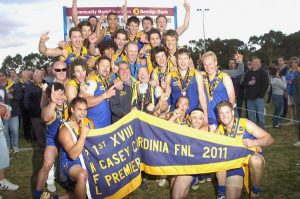
While Nick Scanlon would have happily traded away his five goals on the day for yet another premiership medallion, he acknowledged that Cranbourne – driven by the hurt of 2010 – were a brilliant football side.
“They were the best side all year, and from memory they didn’t lose any big names – to their credit they deserved to be there in 2010,” he said.
“They would have been gutted, and losing that prelim would have definitely revved them up for the next year, and we knew that they were coming.
“2011, we would have been the underdogs, Cranbourne well and truly deserved to be there on the day and we gave it our all.
“We were essentially – as much as won the flag in 2010 – a new rebuilding team under Chris Toner, he brought in a lot of new drills and we were still learning on the fly after winning a flag.
“To get that close and to be thereabouts in the last quarter before fading out gave us a lot of confidence, and having lost a grand final, for me, the first out of five grand finals I’ve lost, it was a new feeling, and not a good feeling.
“It makes you just want to come back bigger and stronger.”
While acknowledging Cranbourne had the wood on them in 2011, Magpies coach Chris Toner said that the club couldn’t just rest on their laurels – they had to make some on-field changes and address a rare grand final defeat.
“That really grated on us, but we were young at that stage, and had some immature type bodies,” he said.
“We were fortunate enough to get Kerem Baskaya and his brother (Kain), along with Steve Watson. Andy Soumillas also came across as well from Drouin, so four really good players and we needed that.”
But with the rivalry bubbling away, Toner said there was extra desire within everyone at the football club to hunt down a potential Cranbourne dynasty and attempt to stop it in its tracks.
“We got beaten in the first round of 2011 at Cranbourne – Koopy’s response when he spoke to both sides at the after match was ‘it’s always a good day when you beat Narre Warren by 12 goals’,” he said.
“That got under my skin and we were hell-bent on making sure we had a good game every time we played them.
“Koopy almost made a comment when they got us by a point out at Narre Warren one day along the lines that ‘we’re coming after you’.
“And Billy King was the chairman of selectors at the time, and his son was in our team, so there was a bit of byplay – they were a terrific side, and we were fortunate enough to win the last one by a second.
“We played so many games and grand finals, and a lot of the time it was just a point that was the difference.
“Sometimes it made for a toxic environment, because it didn’t break out once, it broke out several times – they were equally as fierce as us.
“It spilled out with coaches and all sorts of stuff, but by the same token, that period was very enjoyable.”
With once again the Eagles and Magpies ruling the roost in 2012 with a series of riveting home-and-away matches, the two powerhouses added yet another enthralling chapter in its building rivalry, with its second consecutive grand final at Edwin Flack Reserve described by the Gazette at the time as a “spectacle for the ages”.
And a spectacle it was – a breathtaking shootout between two clubs pushing themselves to the point of exhaustion.
The fans were treated to an epic in the clubs’ second grand final instalment in a row, with the Magpies emerging as premiers by 22 points, 22.13 (145) to 19.9 (123).
In what was a stark contrast to the low-scoring semi-final played only weeks prior, the game started slowly before a Justin Berry major opened up the floodgates until the final siren.
On a day where skill came to the fore, the Magpies just had the edge, kicking seven or eight from outside 50 alone, and turning the tables on the disappointment of 2011.
“That grand final was the best game of footy I’ve been involved in. You won’t see another grand final quite like it,” Toner said of the premiership victory.
“We were of the opinion that if we kicked 20 goals each week, and if anyone can get more than that they deserve to beat us – when you play Cranbourne, they just had so much firepower.
“It wasn’t that the defences were poor, just the quality of the forwards were that good – I think Aaron McIver kicked 63 for the year which as a small was incredible when Bas was marking everything and he had a terrific grand final, kicking four or something.
“There was just quality everywhere, Collo’s kicking them from the midfield, Parker running down and kicking them.
We had a perfect mix, we brought guys in hell-bent on winning flags – they would have crawled over broken glass to win a flag, so they brought so much to such a potent side.”
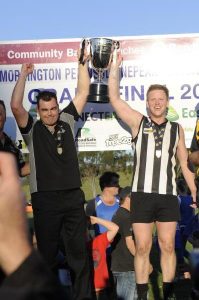
From behind the gates, and among the passionate fans, Baker said there hasn’t been a grand final quite like it – the speed, skill and desire to win.
But he reiterated that the Eagles were left disappointed and clinging onto the same attitude lingering from the 2010 preliminary final defeat – that this wasn’t going to happen again.
“We got off to a four, five goal lead at one point, and it was almost reversed from the year before, they just got us in the end,” he said.
“Maybe we just had the expectation we were going to win, I’m not sure why the season flipped, our personnel didn’t flip and we actually added a few guys too, but we couldn’t get over the line.
“They were probably spurred on from last year and losing to a side that has just broken a drought. They found another gear, and they were just able to turn it when they had to.”
Once again a crucial factor in the Magpies’ epic grand final victory with three goals, Scanlon said the decider was incredible to be involved in.
“If you look at the scoreline of the 2012 grand final, you can see it was an absolute shoot-out,” he said.
“It was all attack, and it was a nice sunny day, and basically both sides attacked and we’d see who the best team was going to be.
“There were a bit more defensive tactics leading into those games, but we backed ourselves.”
But aside from the scoreline on the day, Scanlon said hunting down Cranbourne after the brilliant Eagles toppled them in 2011 took a heap off hard-work and decisions about how best to improve the list.
“We brought in some pretty handy recruits, Andy Soumilas was already a country footy star and won many league best and fairests, the Baskaya brothers and Steve Watson in the ruck,” he said.
“There were some really crucial positions filled with those stars of the game, and it gave us that extra class in that game style compared to the year before.”
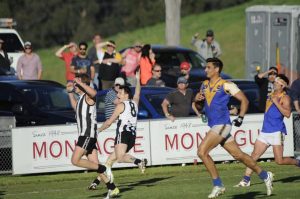
With sports editor Dave Nagel amongst the pack taking it all in, he said it was one of the great games of country football he’s ever seen.
“The grand final was the greatest I’ve seen,” he declared.
“I remember Matty Rus when I went to the three quarter time huddle, he had a big egg on his eye, that’s how brutal it was, no one took a backwards step that day.
“And the pace they were hitting was just phenomenal – it was brutal.”
With Marc Holt snaring eight on the day and Kerem Baskaya sending six through the sticks, Toner compared the great full-forwards who lit up the big stage to some of the legends of eras past.
“You probably won’t see it again, two full-forwards, like Kerem and Holty,” he said.
“It was almost back to the Dunstall and Lockett days just to see who kicked the most goals each week. That’s how good those two blokes were.”
With the rivalry at its absolute crescendo, there was one last grand final tale to tell – the 2013 epic to end it all, and one remembered for the Quirk of fate in the last second.
But the Eagles almost toppled the mighty Magpies side shooting for its 36th straight win – a 108-year record – in the league.
Feared, and after an absolutely golden home-and-away season, it seemed that the only side – as has been the case for four years – that could bring the Magpies down was Cranbourne. And they almost did.
It would have been one of the great upsets in league history, but the Magpies just found something.
The trusty leg of Dylan Quirk.
Six points behind with just a minute left on the clock and the ball parked at the other end of Pakenham’s Toomuc Reserve, an Andrew Hunter goal levelled the scores before Quirk – 19 years of age at the time – left a monster crowd stunned with a point with the last kick of the game and a second on the clock.
As the dominant side of the season, with an average winning margin of 88 points, Cranbourne came hard, recovering from 38 points down to hit the front in the dying stages.
It was also Doug Koop’s last game at the helm, and one that his players particularly lifted for.
But as Toner said upon reflection, the game was an extremely tough one for his group to rise for, explaining that the occasion, and the inevitable challenge of Cranbourne almost took its toll and cost his side.
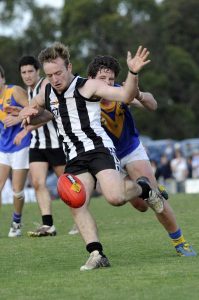
106294 Picture: STEWART CHAMBERS
“We won by about 12 goals in the semi, and thought we might run over the top in the grand final, but once again, there was a lot of byplay,” he said.
“We beat the MPNFL record, and you go in where it’s the coach’s last game, and his players were very loyal to him, and they were as tight as what we were – they played out of their skins that day and they should be very proud of that.
“But at half-time we were four goals in front, but the players were done – they needed a cuddle.
“There was nothing left in the legs, and instead of yelling, we had to coerce them over the line – they were out on their feet against a quality opponent.”
But despite the Eagles falling short in an agonising defeat, Shane Baker said the club was unbelievably proud of its efforts in pushing one of the giants of Victorian local football.
“We sort of felt we were slipping a fraction at times that year, but Narre kept motoring along – they were clear favourites for the flag,” he said.
“That second-semi they tore us a new one, and that was probably the motivation to say it won’t happen again.
“In the grand final, they got away to a lead – but Holty played a blinder, Maxy Gearon was fantastic, and just when we thought we could snatch it, we fell short.
“It’s a testament to Narre, they could have thought it wasn’t their day, but they stood up and went again when they had to, as good teams often do.”
There was also a “bittersweet” sentiment to the premiership victory for Nick Scanlon – who once again was prominent as the Magpies broke the record and secured another cup for the trophy cabinet.
“You ask anyone on the day, they’ll still talk about it – when you catch up from anyone from that day, that’s the first thing they’ll talk about (Dylan’s point),” he said.
“Personally, I was a little bit flat, it was my first grand final with my brother and he went off in the first quarter with a nasty broken arm and he had to go off to hospital.
“It was a little bittersweet to be honest – you’re full of excitement, and it’s one of the great feelings in footy, being in front on grand final when the siren goes – but I had in the back of mind that I got to win it with my brother, but he was in hospital preparing for surgery on his arm.”
Scanlon said that the composure shown by Quirk – just a teenager at the time – is indicative of the footballer he’s become – now the captain of the football club and an admired leader and midfielder around the region.
“It was a big moment late in the game, and a lot of young kids at that age might have tried to hide, but he grabbed the game by the scruff of the neck when it counted, and he had so much composure,” he said.
“I’ve watched the replay of that moment, and the ball was scrambling around, people were fumbling and falling over, but he had so much composure to pick it up, straighten and just have a shot at goal.
“It could have gone any way, but to have that composure at that age and to get the job done has then boosted him – he’s now the captain of the club, a best and fairest winner and he’ll be one of the greats of the club.”
Dave Nagel said that in those final moments, it appeared that the Eagles had pulled off the most famous of grand final victories against an opponent almost invincible at the time. It would have been one of the great grand final upsets ever in his well-informed opinion.
“Narre won 35 in a row and that’s the all-time MPNFL record – if you had set a market before the game, they would have been $1.20 favourites,” he said.
“On that day, Max Gearon played the game of his life and as the game unfolded, Narre just couldn’t break free and get enough of a lead.
“With a minute or two left Cranbourne were five points up and there was a one-on-one in the goal square with Marc Holt and Lee Boyle, and I believed Cranbourne had done it. But Boyle spoiled it through to make it six points.
“From the kick out they got the ball, Hunter kicked a goal and the ball went back into the middle and Quirk kicked the point and the siren went straight after it.”
Despite the agony of grand final defeat, Koop was resolute and proud in his final game in an interview in the rooms after the game that summed up his emotions and love for his players.
“The players have been phenomenal; the players aren’t interested in politics and s*** like that,” he said at the time.
“I said to them today that probably the two best decisions I’ve made in the last six years was one, accepting the invitation to talk to Cranbourne, because I was out of footy and not that keen.
“The second was, when they sacked me, I can’t leave these blokes, I don’t want to leave them because I know the quality that’s in them and I want to be part of this success. Unfortunately we fell one point short.”
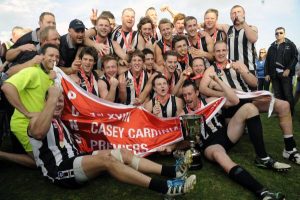
Despite registering a 2-1 grand final record across an incredibly absorbing three year period, Scanlon pointed to the 2014 finals series as an indicator of just how much spirit and fight was in the Cranbourne side despite falling short two years in a row.
“When it comes to grand finals, to edge them out and have that buffer there’s a great deal of satisfaction,” he said.
“But the story probably does roll into 2014 to be honest, and they’ll feel like they got one back on us that year.”
The clash Scanlon is referring to was the end of the Magpies’ run at yet another three peat of premierships.
In the preliminary final against the Eagles at Holm Park, Cranbourne were truly down in the dumps, 41 points adrift midway through the third term, before skipper Marc Holt’s stunning eight goals – off basically one leg – saw them pull of one of the most remarkable victories of recent memory.
The 2500 strong crowd were left in amazement as a late 50 metre penalty goal sealed the deal for Cranbourne.
But it was more than just that day that cost the Magpies as they quickly found themselves out in straight sets – a reality almost foreign to everyone involved with the football club over the last two decades.
“We had a strange finals series – we went through undefeated, we were currently holding the record of straight wins at local level, and we came up against Beaconsfield at Pakenham, and when the siren went the scores were actually level on the scoreboard,” Scanlon said.
“We were all preparing for extra time, but the goal umpire came over and changed it and they awarded Beacy the win by one point, apparently the scoreboard was wrong.
“So Beacy went straight through, and we had to play Cranbourne at Beaconsfield at the new ground, and we had a healthy six goal lead during the third quarter, and it got close late, as it always does with them, and they found a way to get back.
“They clawed back, and late in the game, we were up by less than a goal, maybe two to three points, and I remember, I think Troy Tharle, took a mark about 60 from goal and went to play on, and the umpire didn’t call play on, and our player went to tackle him and gave away 50.
“They kicked a goal, and the siren went at the next bounce, so we went out in straight sets.
“As much as we were 2-1 over them, I reckon they would have got great satisfaction in knocking us out in straight sets.”
That sense of satisfaction by all involved was certainly evident at Cranbourne, with Baker believing it was certainly a match that turned the fortunes of both clubs in many ways.
“We always rise a bit for Narre as they would for us, and the prelim was one of those freaky games,” he said.
“We were down by about seven goals in the last quarter, and the great man Marc Holt, as he usually does, got it done.
“It was one of the more remarkable wins – I know it hurt Narre a bit, it probably set them back a bit.
“But we played one good quarter of footy that whole finals series, and got into a grand final from it.”
There’s almost a sense of inevitability that it’s more of a ‘when’ rather than an ‘if’ these two clubs will renew hostilities on the biggest stage of them all in the coming years, and for the Eagles president Baker, he believes seeing the clubs regenerate its epic rivalry would be a huge boost for the area.
“It’s a rivalry waiting to kick start itself a bit I think,” he said.
“We’ve both been in the wilderness a bit until last year with Narre, and we both haven’t been in the peak again like we were in the early teens.
“It would be great, and it would really regenerate the comp in the area too, people just turn up to watch them because they’re such fierce rivals.”
This same sentiment of inevitability is also firmly in the mind of Toner, who believes the hunger of both clubs, and that underlying desire to reignite the rivalry in a grand final again is being driven by the club’s leaders – some of whom are still playing.
“Just to beat Cranbourne in a home-and-away game was huge for us, we couldn’t do it,” he said.
“While I was coach they might have got us the first four or five times we played, and then we went on beat them for the next seven or eight.
“But the team that knocked us off our perch again and broke our unbeaten record of 44 wins, was Cranbourne.
“This side now running around, it’s still fresh for them, they’ve got it in their heads – they respect the past, and some of them are still playing.
“And Dylan Quirk drives that point home now.”

